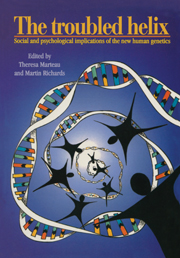Book contents
- Frontmatter
- Contents
- List of contributors
- Preface
- Preface to the paperback edition
- Acknowledgements
- Part I Personal stories
- Part II Clinical context
- 2 The new genetics: a user's guide
- 3 Decision-making in the context of genetic risk
- 4 Genetic counselling: some issues of theory and practice
- 5 Evaluating carrier testing: objectives and outcomes
- 6 Psychosocial aspects of prenatal screening and diagnosis
- 7 The genetic testing of children: a clinical perspective
- 8 Predictive genetic testing in children: paternalism or empiricism?
- Part III Social context
- Index
3 - Decision-making in the context of genetic risk
from Part II - Clinical context
Published online by Cambridge University Press: 01 June 2011
- Frontmatter
- Contents
- List of contributors
- Preface
- Preface to the paperback edition
- Acknowledgements
- Part I Personal stories
- Part II Clinical context
- 2 The new genetics: a user's guide
- 3 Decision-making in the context of genetic risk
- 4 Genetic counselling: some issues of theory and practice
- 5 Evaluating carrier testing: objectives and outcomes
- 6 Psychosocial aspects of prenatal screening and diagnosis
- 7 The genetic testing of children: a clinical perspective
- 8 Predictive genetic testing in children: paternalism or empiricism?
- Part III Social context
- Index
Summary
The significance of genetics would have remained purely in the scientific realm had it not begun to affect decisions made by and about individuals. The inseparability of clinical genetics from decision-making is illustrated in reviews of the literature on genetic counselling, which are devoted in large part to studies about the process and outcomes of counsellees' decisions (Evers-Kiebooms and Van den Berghe, 1979; Reif and Baitsch, 1985; Kessler, 1989). Decision-making was recognised as one of the key elements in genetic counselling (Fraser, 1974), and was further emphasised by Bringle and Antley's (1980) elaboration of genetic counselling into a model for counsellee decision-making. Kessler (1980) considered the increasing importance of decision-making in genetic counselling as part of its general shift away from eugenic values towards a psychological paradigm. The underlying logic behind these views is that individuals should be appropriately informed about their genetic risks and behavioural options to deal with those risks, and that they would use that information vigilantly to choose among the alternatives made available by newly developed genetic technologies. Before genetic counselling, most people do not even know about these options: they do not perceive the situation as a decision until explicitly told it is by the genetic counsellor (Beeson and Golbus, 1985).
Putting individuals in a situation of choice about genetic risks fits the broader trend of the evolution of behavioural mechanisms that serve to regulate chance events – a trend expressed most vividly in the growing importance of individual choice over reproduction (Miller, 1983).
- Type
- Chapter
- Information
- The Troubled HelixSocial and Psychological Implications of the New Human Genetics, pp. 82 - 103Publisher: Cambridge University PressPrint publication year: 1996
- 58
- Cited by



